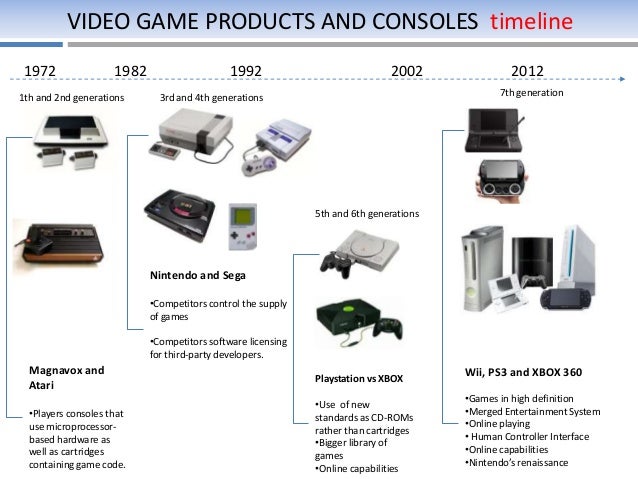
From Wikipedia, the free encyclopedia



- The Sixth generation of video game hardware (1998-2013) expanded the home console market. This era introduced online gaming. After SEGA's market failure with the SEGA Saturn, they released a new console in 1999 known as the Dreamcast. During the Dreamcast's development, Sony announced the PlayStation 2 which would be released one year later. The Dreamcast did well for 1999 and 2000, but SEGA.
- In the history of video games, the sixth-generation era (sometimes called the 128-bit era; see 'bits and system power' below) refers to the computer and video games, video game consoles, and handheld gaming devices available at the turn of the 21st century, starting on November 27, 1998.
- In the history of video games, the sixth-generation era refers to the computer and video games, video game consoles, and handheld gaming devices available at the turn of the 21st century, starting on November 27, 1998. Platforms in the sixth generation include consoles from four companies: the Sega Dreamcast, Sony PlayStation 2, Nintendo GameCube, and Microsoft Xbox. This era began on.

Bot arena 3&& try the games online. In the history of video games, the sixth-generation era (sometimes referred to as the 128-bit era; see 'Bits and system power' below) refers to the computer and video games, video game consoles, and video game handhelds available at the turn of the 21st century which was from 1998 to 2005. Platforms of the sixth generation include the Sega Dreamcast, Sony PlayStation 2, Nintendo GameCube,. Sixth Generation: 1995–1998 The sixth generation of home video games featured high-powered microprocessors and dedicated graphics processors that enabled extremely realistic graphics and game play. These game consoles outperformed the much higher-priced personal computer systems of the day.
{{bottomLinkPreText}}{{bottomLinkText}} This page is based on a Wikipedia article written by contributors (read/edit).
Text is available under the CC BY-SA 4.0 license; additional terms may apply.
Images, videos and audio are available under their respective licenses.
Cover photo is available under {{::mainImage.info.license.name || 'Unknown'}} license.Cover photo is available under {{::mainImage.info.license.name || 'Unknown'}} license. Credit: (see original file).
Advanced ninja unblocked. The Sixth generation of video game hardware (1998-2013) expanded the home console market. Gift guide giveaway: monday's winners list. This era introduced online gaming. After SEGA's market failure with the SEGA Saturn, they released a new console in 1999 known as the Dreamcast. During the Dreamcast's development, Sony announced the PlayStation 2 which would be released one year later. The Dreamcast did well for 1999 and 2000, but SEGA couldn't compete with the PlayStation 2's DVD capability and growing game library, as well as the announcement of Microsoft's Xbox and Nintendo's GameCube. SEGA dropped out of the hardware market, and joined the 3rd party game designer business. The three consoles competed for the next five years until the next generation came to be.
Sixth Generation Consolesthe History Of Video Games On
| Part of a series on: |
| History of video games |
|---|
- Sixth generation (1998–2013)
|
| v·d·e |
| v·d·eSixth-Generation Hardware |
|---|
Arcade Cabinets·Arcade Consoles·Augmented Reality·Dedicated Consoles·Handheld Consoles·Home Computers·Home Consoles·Microcomputers·Microconsoles·Personal Computers & Laptops·Single-Board Computers·Smart TVs·Smartphones·Tablets·Virtual Reality | | Microsoft |
|---|
| Nintendo | Game Boy Advance·Game Boy Advance SP [Version 2] ·Game Boy micro·GameCube |
|---|
| SEGA |
|---|
| Sony | PlayStation 2 [Slimline] ·PSX |
|---|
| Others | GP32·N-Gage [QD] ·Neo Geo Pocket Color·Panasonic Q·Pokémon Mini·Tapwave Zodiac·V.Smile Pocket |
|---|
Video game hardware generations
First (1972-80)·Second (1976-92)·Third (1983-2003)·Fourth (1987-2003)·Fifth (1993-2005)·Sixth (1998-2013)·Seventh (2005-19)·Eighth (2012-)·Ninth (2020-) |
|
Sixth Generation Consolesthe History Of Video Games To Play
| v·d·eHistory of video games |
|---|
| By system | - Arcade game history
- Computer
- Electronic game
- Video game console history
- Handheld game systems
|
|---|
| By genre |
|---|
| Lists |
|---|
|
Sixth Generation Consolesthe History Of Video Games Free
Retrieved from 'https://gamicus.gamepedia.com/Sixth_generation_of_video_game_hardware?oldid=95541'





